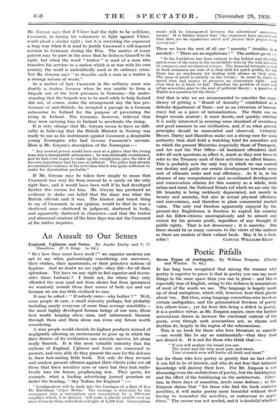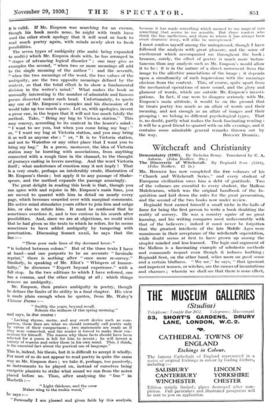Poetic Pitfalls
Seven Types of Ambiguity. By William Empson. (Chatto and Windus. 78. 6d.) Jr has long been recognized that among the reasons why poetry is superior to prose is that in poetry you can say more things in the same space than you can in prose : and this is especially true of English, owing to the richness in associations of most of the words we use. The language is largely made up of dead metaphors, which still, however, bear their ghosts about 'ern. But then, using language concertina-wise involves certain ambiguities, and the grammatical freedom of poetry Jets others loose ; yet far from this being a defect in poetry, it is a positive virtue, as Mr. Empson argues, since the further associations drawn in increase the emotional content of the poem, even though such associations act, as rhyme and rhythm do, largely in the region of the subconscious.
This is no book for those who love literature so scantily —one would like to say so sentimentally—that they dare not dissect it. It is not for those who think that :—
" If you will analyse the bread you eat,
The water and the wine most pure and sweet,
Your stomach soon will loathe all drink and meat," but for those who love poetry so greatly that no fact about it can fail to be of interest, and who do not fear that intimate knowledge will destroy their lore. For Mr. Empson is not discussing even the architecture of poetry, but the bricklaying, and the effect of the bricklaying on the architecture. Critic- ism, in these days of sensation, needs some defence ; so Mr. Empsonclaims that "for those who find the book contains novelties, it will make poetry more beautiful without their having to remember the novelties, or endeavour to apply them." The excuse was not needed, and it is doubtful whether fit is valid. If Mr. Empson was searching for an excuse, though his book needs none, he might with truth have used the other stock apology that it will send us back to read much poetry again, with minds newly alert to fresh possibilities.
The seven types of ambiguity (the arabi- being expanded to multi-) which Mr. Empson deals with, he has arranged in stages of advancing logical disorder" ; one may give as examples the second, "when two or more meanings all add to the single meaning of the author " : and the seventh, "when the two meanings of the word, the two values of the ambiguity, are the two opposite meanings defined by the context, so that the total effect is to show a fundamental division in the writer's mind." What makes the book so unusually interesting is the number of admirable and famous poems dissected under each head. Unfortunately, to quote any one of Mr. Empson's examples and his discussion of it would take up too much space. Let us, with apologies, invent a prose one, in the hopes that it will not too much falsify the method. Take, "Bring my bag to Victim ia station." This may convey, according to its context in the hearer's mind : "I want to see you, but when you come bring my bag:" or, "I want my bag at Victoria station, and you may bring it as well as anyone else : " or, "it is to Victoria station, and not to Waterloo or any other place that I want you to bring my bag." In a poem, moreover, the idea of Victoria station may be bursting with associations, from anything connected with a rough time in the channel, to the thought of journeys ending in lovers meeting. And the word Victoria itself ; what undertones of emotion may it not imply I That Is a very crude, perhaps an intolerably crude, illustration of Mr. Empson's thesis ; but apply it to any possqge of Shake- speare, and the method expands the passage amazingly.
The great delight in reading this book is that, though you
can agree with and rejoice in Mr. Empson's main lines, you are moved to quarrel with him in detail on nearly every page, which becomes scrawled over with marginal comments. His active mind stimulates yours either to join him and outgo him, or else to refute him. It must be confessed that he sometimes overdoes it, and is too curious in his search after possibilities. And, since we are at objections, we could wish that he had given us the texts to which he refers, for he seems sometimes to have added ambiguity by tampering with punctuation. Discussing Sonnet xxxii, he says that the line :— "These poor rude lines of thy deceased lover:" "is isolated between colons." But of the three texts I have at hand—and one purports to be an accurate "facsimile reprint," there is nothing after "once more re-survey." Similarly, in speaking of Mr. Eliot's "Whispers of Immor- tality," he discusses 'Expert beyond experience." with a full stop. In the two editions to which I have referred, one has a comma, and the other nothing at all ; which things remove an ambiguity.
Mr. Empson, then praises ambiguity in poetry, though be defines the limits of its utility in a final chapter. His view is made plain enough when he quotes, from Mr. Waley's Chinese Poems :—
" Swiftly the years, beyond recall.
Solemn the stillness of this spring morning."
and says, in due course :
'Lacking rhyme, metre, and any overt device such as com- parison these lines are what we should normally call poetry only
virtue of their compactness ; two statements are made as if they were connected, and the reader is forced to make their con- nexions for himself. The reason why these facts should have been selected for a poem is left for him to invent ; he will invent a variety of reasons and order them in his own mind. This:, I think, is the essential fact about the poetical use of language."
This is, indeed, his thesis, but it is difficult to accept it wholly. For most of us do not appear to read poetry in quite the same way as Mr. Empson does ; we take it, perhaps, too passively, as instruments to be played on, instead of ourselves being energetic pianists to strike what sound we can from the notes Placed before us. Thus, after analysing the " line " in Macbeth :— "Light thickens, and the crow Makes wing to the rookie wood,"
he says
'Personally I am pleased and given faith by this analysis,
because it has made something which seemed to me magical into something that seems to me sensible. But those readers who think the line ineffective, and those to whom it has always been overt dramatic irony, will alike be unimpressed."
I must confess myself among the unimpressed, though I have followed the analysis with great pleasure, and the sense of excitement which accompanied me throughout the book ; because, surely, the effect of poetry is much more instan- taneous than any analysis such as Mr. Empson's would allow it to be : it is in the nature of a direct movement from the image to the affective associations of the image ; it depends upon a simultaneity of such impressions with the meanings obvious from the context. This, of course, quite apart from the mechanical operations of mere sound, and the glory and glamour of words, which are outside Mr. Empson's investi- gations. In fact, if one were to disagree seriously with Mr. Empson's main attitude, it would be on the ground that he treats poetry too much as an affair of words and their meaning, and not enough as an affair of images and their grouping : we belong to different psychological types. That is, no doubt, partly what makes the book fascinating reading : it will be a good friend to quarrel with on idle evenings, and it contains some admirable general remarks thrown out by











































 Previous page
Previous page